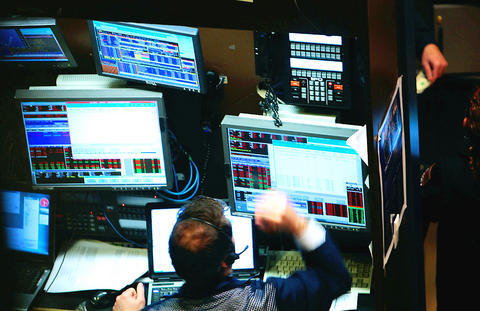With economic news getting bleaker by the day and worries growing about credit markets seizing up, Wall Street investors have been scurrying for cover.
The main US indexes have hit their lowest levels in a year and a half as fears about recession have risen and consumers and business are battening down the hatches to ride out an expected economic storm.
The Dow Jones Industrial Average tumbled 3.04 percent for the week to close Friday at 11,893.69, its worst level since October 2006.

PHOTO: AFP
The tech-heavy NASDAQ composite slid 2.59 percent to 2,212.49 while the broad-market Standard & Poor's 500 index retreated 2.8 percent to 1,293.37.
The market wallowed in losses as any doubts about a deep crisis in the world's biggest economy were erased by data in the past week. The key was Friday's report showing a loss of 63,000 jobs last month, signaling a sharp deceleration in economic momentum.
Even the White House was unable to put a favorable spin on the news.
US President George W. Bush's top economic adviser, Ed Lazear, did not rule out shrinking economic activity for the current quarter.
"We don't really know whether it will be negative or not," Lazear told reporters. "This quarter will probably be our weakest quarter ... Whether you call that 'a recession' or not is something that we won't know for many months."
Most private economists said the writing was on the wall.
Ethan Harris, economist at Lehman Brothers, said the Federal Reserve's interest rate cuts and US$168 billion economic stimulus passed by Congress will be too late to avert a recession.
"While we are penciling in a very mild recession, it is important to not get hung up on the `recession, no recession' debate," he said. "The more fundamental point is that the economy is likely to experience an extended period of very weak growth, a rising unemployment rate and significant further Fed rate cuts."
The Fed stepped up efforts to shore up the banking system by boosting liquidity in direct credit auctions and repurchase agreements, moves that could pump US$200 billion into markets. But some say that might not be enough to jump-start an ailing economy.
Bonds failed to gain as inflation concerns offset the impact of safe-haven flows. The yield on the 10-year Treasury bond increased to 3.541 percent from 3.534 percent a week earlier, while that on the 30-year bond rose to 4.541 percent from 4.420 percent.

GEOPOLITICAL ISSUES? The economics ministry said that political factors should not affect supply chains linking global satellite firms and Taiwanese manufacturers Elon Musk’s Space Exploration Technologies Corp (SpaceX) asked Taiwanese suppliers to transfer manufacturing out of Taiwan, leading to some relocating portions of their supply chain, according to sources employed by and close to the equipment makers and corporate documents. A source at a company that is one of the numerous subcontractors that provide components for SpaceX’s Starlink satellite Internet products said that SpaceX asked their manufacturers to produce outside of Taiwan because of geopolitical risks, pushing at least one to move production to Vietnam. A second source who collaborates with Taiwanese satellite component makers in the nation said that suppliers were directly

Top Taiwanese officials yesterday moved to ease concern about the potential fallout of Donald Trump’s return to the White House, making a case that the technology restrictions promised by the former US president against China would outweigh the risks to the island. The prospect of Trump’s victory in this week’s election is a worry for Taipei given the Republican nominee in the past cast doubt over the US commitment to defend it from Beijing. But other policies championed by Trump toward China hold some appeal for Taiwan. National Development Council Minister Paul Liu (劉鏡清) described the proposed technology curbs as potentially having

EXPORT CONTROLS: US lawmakers have grown more concerned that the US Department of Commerce might not be aggressively enforcing its chip restrictions The US on Friday said it imposed a US$500,000 penalty on New York-based GlobalFoundries Inc, the world’s third-largest contract chipmaker, for shipping chips without authorization to an affiliate of blacklisted Chinese chipmaker Semiconductor Manufacturing International Corp (SMIC, 中芯). The US Department of Commerce in a statement said GlobalFoundries sent 74 shipments worth US$17.1 million to SJ Semiconductor Corp (盛合晶微半導體), an affiliate of SMIC, without seeking a license. Both SMIC and SJ Semiconductor were added to the department’s trade restriction Entity List in 2020 over SMIC’s alleged ties to the Chinese military-industrial complex. SMIC has denied wrongdoing. Exports to firms on the list

SPECULATION: The central bank cut the loan-to-value ratio for mortgages on second homes by 10 percent and denied grace periods to prevent a real-estate bubble The central bank’s board members in September agreed to tighten lending terms to induce a soft landing in the housing market, although some raised doubts that they would achieve the intended effect, the meeting’s minutes released yesterday showed. The central bank on Sept. 18 introduced harsher loan restrictions for mortgages across Taiwan in the hope of curbing housing speculation and hoarding that could create a bubble and threaten the financial system’s stability. Toward the aim, it cut the loan-to-value ratio by 10 percent for second and subsequent home mortgages and denied grace periods for first mortgages if applicants already owned other residential